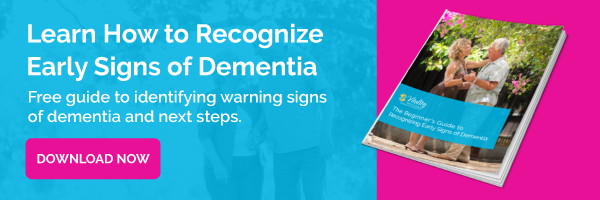There is no denying that the prospect of your loved one developing dementia is overwhelming. Dementia removes a person’s memories and even has the potential of changing personality and habits in unexpected ways.
Though we never want our parents to go through this, it is important to pay attention to all of the possible signs of dementia indicating that something may be going on. The reality is that when dementia starts to impact your loved one’s everyday life, it may be time to seek a professional evaluation and begin pursuing additional care.
Download The Beginner’s Guide to Recognizing Early Signs of Dementia
What Is Dementia?
Dementia is a degeneration of the brain that interferes with a person’s thinking process, memory, and ability to reason. This happens because the parts of the brain used for learning, memory, and decision-making have somehow been compromised by damage or disease.
Dementia is a neurocognitive disorder and is not actually a disease but a collection of symptoms that are the result of other existing conditions. Alzheimers’s disease is typically the most common cause of this disorder. Sixty percent to 80 percent of those with dementia have Alzheimer’s.
Warning Signs of Dementia
- Short-term memory loss. Short term memory loss can start out seemingly normal with everyday things such as lost keys or an unpaid bill. It becomes more concerning when the memory loss disrupts life.
- Difficulty carrying out conversations. It is not uncommon for a person to have difficulties putting their thoughts into words when they have dementia. It may be difficult to join or follow a conversation or be unable to find the right words.
- Changes in mood or temperament. Another early sign is unpredictable changes in mood. The person can become instantly sad or angry, even when the precise cause is difficult to distinguish.
- Inability to follow instructions. Those who have dementia develop an inability to perform daily activities, navigate to familiar destinations, and complete routine chores or jobs.
- Inability to recognize places. Someone suffering from dementia can get lost easily or suddenly not be able to remember how he or she got somewhere.
- Becoming an observer. In social situations, someone with dementia may act more as an observer than an active participant as it becomes difficult to follow the track of conversations.
- Trouble completing daily routines. Normal daily tasks, such as washing the dishes or folding the laundry, often start to fall to the wayside.
- Avoiding change. A person with dementia has a hard time processing something new or different from what he or she is used to.
- Lapses of judgement. Individuals with dementia may make decisions or choices that are out of character potentially posing safety concerns. For example, not dressing appropriately for the weather.
- Repetition. A person with dementia will often repeat stories and ask repetitive questions.
- Social withdrawal. As memory loss begins to impact daily life, it is common for those with dementia to reduce social interactions such as joining card clubs or participating in cherished activities.
Finding the Right Residence
When looking for housing for a loved one with dementia, be sure to evaluate:
- Environment. Look for warm and welcoming environments with outdoor spaces, bright lighting, and dignified decor.
- Engagement Programming. Find communities that provide the ability for your loved one to enjoy favorite interests and hobbies, follow personalized care plans based on preferences, and take part in routines.
- Expertise & Training. Ask about the training and support is offered to the caregivers and what education is offered to the families.
- Acceptance. Watch how the staff interacts with your loved one to evaluate whether they are focused on the person or just on the disease. Do they make eye contact, do they address your loved one directly, and are they comfortable with the residents? Are they forming real relationships with the people in the community?
- Come informed. Bring a list of the things that are most important to you and your loved one in a senior community so that you can ask the right questions to find a place that works for you.
Take your time when making your choice. When you think you have found the right place, visit it multiple times to ensure you have fully observed the way that the staff interacts with the community and how daily activities are carried out. After a handful of visits, trust your instincts and you will make the right choice for the unique needs of your loved one.




